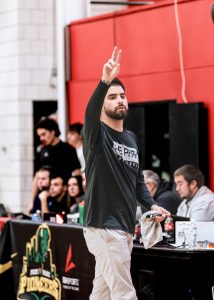Land of the free home of the prey
January 15, 2020
In America, we’re taught every word to the Pledge of Allegiance before we can write our names properly. We’re told to be proud of our stars and stripes before we know what the flag really stands for. We’re trained to have pride in our country and to put that pride above all else. Sometimes, that blind patriotism drowns out the voice in your head telling you to address the flaws within the system. When you’re brought up to believe you’re living in the best country in the world, it becomes extremely difficult to criticize it.
The United States military preys on poverty-stricken individuals and people of color because they know the benefits they offer outweigh the reality of combat.
That might be hard to swallow, and it probably leaves a bad taste if you manage to get it down. It’s not easy to recognize fault within a system you’re so closely tied to. As uncomfortable as it may be, it’s a reality for many marginalized people in America, and it’s necessary that we acknowledge it.
Picture this: You didn’t do as well as you could have your senior year, and it’s really starting to weigh on you. All your friends are headed out of state, but it doesn’t look like college is in the cards for you. Even if you got fantastic grades, you know you couldn’t afford it. You were supposed to be the one that makes it, the one that pulls your family out of debt and buys your mom that house in Florida she’s always wanted. You tried your best, but you failed a lot of classes this semester and you’re starting to lose hope. Just when you’ve accepted that you’re out of options, you’re given a glimpse of hope. A recruiter, complete with his uniform, sitting in your high school lobby tells you the military needs you (yes, you!) to enlist. All your problems are solved!
Except they aren’t solved at all, and you didn’t meet that recruiter by some miraculous stroke of luck.
Army recruiters frequently visit lower income areas, specifically non-metropolitan areas where economic growth is limited. This is where they get the bulk of their recruitments, places where the people don’t have other options to consider. The lower the school’s income is, the higher the recruitments are. They take a high-schooler who feels like he’s losing his balance, and they offer him stability. A steady amount of money, a house and car for his family, fully paid tuition when (and if) he makes it back. In these cases, the need for financial stability outweighs any other concerns that may linger in the student’s minds. There isn’t much freedom of choice in their situation.
During the Civil War, the well-off used their wealth to get themselves out of the draft. Whether they paid someone to go in their place or simply gave the government enough money to excuse them, those that could afford not to enlist didn’t. The less fortunate did not have that opportunity, and were sent off to serve. The draft may not be as prominent of a concern as it was in the 1800’s, but wealth certainly still affects the demographic that enlists in the military. For those living below the poverty line, the military is the only feasible way out. If you look between the stitches, you’ll see the classism woven into your star-spangled banner.
This flawed system affects more than impoverished citizens. For those struggling with citizenship issues, the U.S. military offers naturalization in exchange for military service. The military does not delegate citizenship directly, but has the authority to fast track applications for those enlisted in the forces. The hostility towards immigrants in our current political climate makes this offer even more desirable, subsequently influencing those seeking citizenship to enlist. Whether it’s out of internal obligation, or the promise of receiving something practically unachievable without assistance. It is indisputable that people of color have been disproportionately pushed to align with the armed forces.
For some people, enlisting in the military was a personal decision. These factors don’t influence them, it was simply a career choice that felt right to them. You can want to enlist in the military while also acknowledging they should avoid targeting specific demographics during recruitments. There’s a wide array of options besides college and the military, and it’s important that it isn’t promoted as one or the other. Choice shouldn’t be an illusion, regardless of an individual’s tax bracket or immigration status.
Being an American citizen doesn’t mean you have to turn a blind eye to the shortcomings of the nation. You can exist in a system and still criticize that system; society wouldn’t function if we weren’t capable of self-analysis. Promoting the growth of your country should make you feel like more of an American, not less. You can acknowledge systemic imperfection without compromising your patriotism, and you should be proud to.



















Samantha Hindman • Jan 22, 2020 at 3:35 PM
I loved this. These are the types of opinions I like to see in journalism. People going against the grain because they comprehend the truths others can’t face.
Beth T. • Jan 15, 2020 at 1:44 PM
So true, keep speaking out about this!